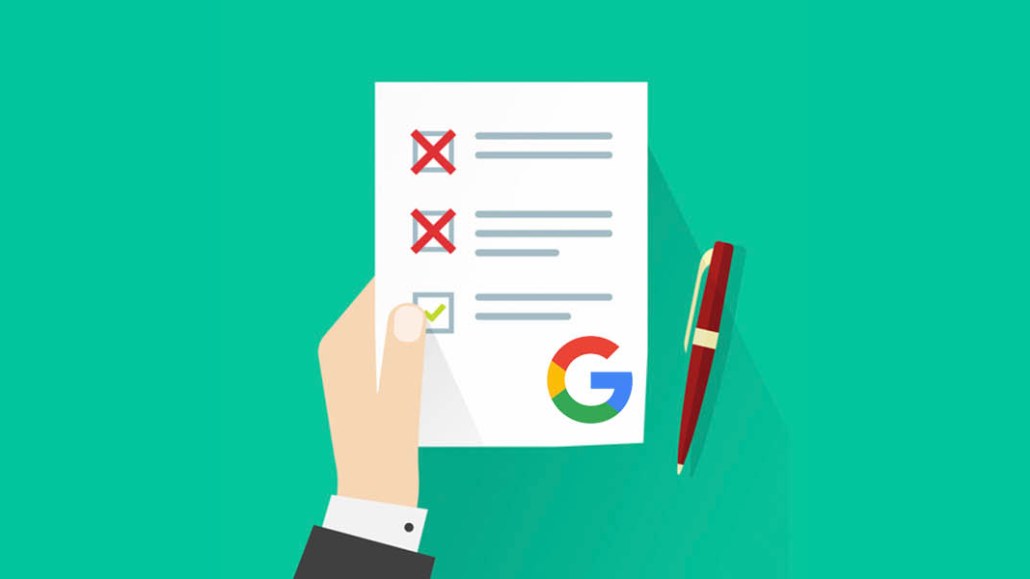Secure your place at the Digiday Media Buying Summit in Nashville, March 2-4

Google has frustrated publishers with its approach to the General Data Protection Regulation.
Less than two weeks until GDPR takes effect on May 25, Google hasn’t registered as a vendor on the Interactive Advertising Bureau Europe’s and IAB Tech Lab’s framework that’s meant to help publishers get consent for publishers and their ad tech vendors to collect and use people’s data.
Publishing and ad tech executives see this absence as another example of Google taking an upper hand in how publishers comply with GDPR. The tech giant has already required publishers using its ad tech to let Google be a “co-controller” of the data that people give the publisher and Google permission to collect and use. And Google is limiting the number of vendors that publishers using its consent management platform can deploy on their sites.
IAB Europe’s framework has its issues, but it is supported as an independent standard developed with input from publishers and ad tech vendors alike. In addition to making it easier to comply with GDPR, the framework is supposed to give publishers more control and transparency over how ad tech vendors use their audience data by standardizing how consent is managed.
Google’s absence from IAB Europe’s framework is “the major issue that’s on my mind two weeks away from the rollout of GDPR,” said John Potter, chief technology officer of Purch and a member of IAB Tech Lab’s GDPR Technical Working Group. He said Google’s approach to managing consent “is not compatible with the IAB framework.”
It’s not clear what’s delaying Google’s registration with IAB Europe’s framework. The process isn’t time-consuming, said Romain Job, chief product officer at ad tech firm Smart, which has registered as a vendor.
A Google spokesperson said Google is working with IAB Europe to support the organization’s framework, but wouldn’t say if the company would register as a vendor by May 25.
Google’s absence from the list of registered vendors means publishers cannot rely on IAB Europe’s framework to set consent for Google. That means publishers have to put a separate system in place to manage consent for Google in addition to IAB Europe’s. Or, they can simplify things by using Google’s own consent framework instead of IAB Europe’s. Publishers could protest Google by not using its ad tech to sell their inventory until the company joins IAB Europe’s framework, but that’s unlikely to happen, given Google’s dominance.
“They’re the largest ad network. You’re not going to not use them,” said Chris Tolles, CEO of Topix.
CafeMedia decided to use Google’s consent framework instead of IAB Europe’s framework after deciding the latter would take too much work to implement by the May 25 deadline. “The Google framework seems a lot easier to set up quickly, and since we collectively don’t have a lot of time right now, that seems like a better way to start,” said Paul Bannister, evp of strategy at CafeMedia.
The ease of using Google’s framework might make it become the default for a lot of people, said Bannister. Google’s odds are further boosted by the fact that its framework features a safety net where publishers that don’t get consent can still make money by running nonpersonalized ads sold by Google.
Download Digiday’s official guide to GDPR for checklists, research and more that you’ll need to know before May 25.
More in Media

Media Briefing: Turning scraped content into paid assets — Amazon and Microsoft build AI marketplaces
Amazon plans an AI content marketplace to join Microsoft’s efforts and pay publishers — but it relies on AI com stop scraping for free.

Overheard at the Digiday AI Marketing Strategies event
Marketers, brands, and tech companies chat in-person at Digiday’s AI Marketing Strategies event about internal friction, how best to use AI tools, and more.

Digiday+ Research: Dow Jones, Business Insider and other publishers on AI-driven search
This report explores how publishers are navigating search as AI reshapes how people access information and how publishers monetize content.







